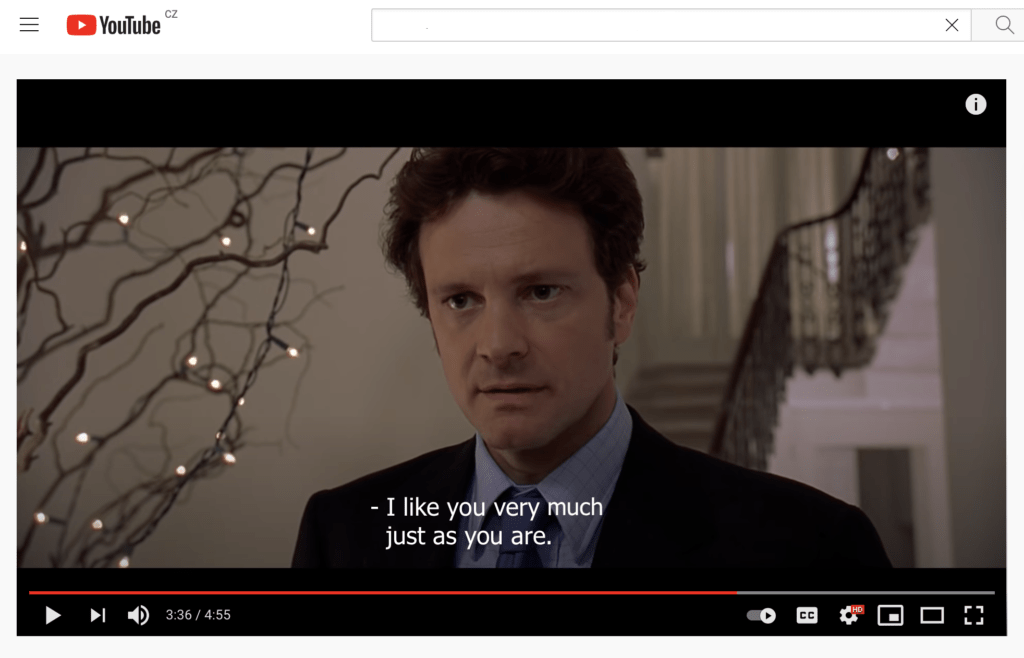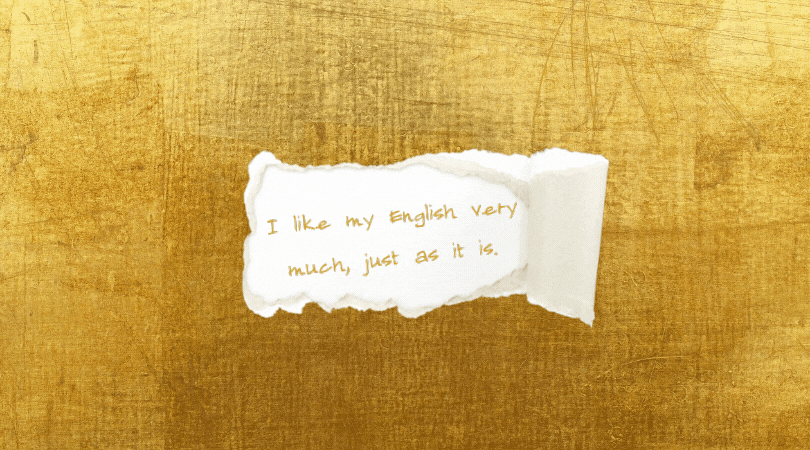If you ever want to like your English,
you have to start liking it now
Tell me if this reminds you of anything: “I like my English very much, just as it is.” No? I’ll give you a hint – the original phrase goes like this: „I like you very much, just as you are.“ It’s from a very popular movie. It’s about a 30-something single woman who is trying to lose weight, quit smoking, and above all, find love. Can you guess the movie?
If you guessed Bridget Jones’s Diary, you were right. Do you remember the scene after the horrible dinner party where Mark Darcy says the I-like-you-just-as-you-are phrase to Bridget Jones? And don’t we all love it? I mean, how could we not?

And I’m sure we can agree that Bridget Jones is far from perfect. Even Mark Darcy says so in that scene. But we love her anyway, right?
Not when she gets perfect (spoiler alert – that’s not going to happen), but we love her despite her imperfections because they make her her. And absolutely the same goes for your English.
If you ever want to feel good about your English or even love it, you have to start feeling good about it now. You have to accept it as it is at this moment.
With all the imperfections.
I know, I keep saying this all the time. But it’s because it is important. And also because it’s difficult to do. But if you don’t, there’s ZERO CHANGE going to happen. Ever.
It’s the same as the feeling of never having enough. Enough money, enough time, enough love. Never being happy enough. We expect some things to happen to make us feel that way, but it’s all happening inside our heads. It’s not coming from outside.
Also, we expect it to happen in the future, and that’s what we focus on. But it can only happen now. It kind of works in reverse compared to how we expect it to. We think that first, some outside change needs to happen for us to feel differently.

And I get it because it seems logical. But this is not how it works. First, we have to change our mind, thoughts, beliefs, aka the internal change. And only then the external change is going to happen.
We believe that at some point, we’ll start feeling the way we want to feel. See, I’ve said: „We’ll start feeling…“ And that’s kind of the key.
It’s not about how much we know, how wide our vocabulary is, how much grammar we’ve mastered. It’s about how we feel. And feelings, in general, are always internal.
We may speak broken English, and it costs us a lot of energy to even speak it. We often struggle with finding the right words, our grammar is far from perfect, but we feel good about our English anyway.
On the other hand,
we may communicate in English on a daily basis and our vocabulary is wider than that of some native speakers. We have external proofs that our English is good, but we still feel that our English sucks really badly.
It’s always up to us to choose how we’re going to feel. So, when are you going to change the way you feel about your English? When, if not now? What is the moment in the future when it will be right? How can you tell? How do you define it?
Think about it, then take a piece of paper and write it down. What do you believe must happen for you to feel good about your English?
Go, do it now. I’ll be here when you come back. I’ll be listening to this album to keep myself occupied.
You’re back? Already? I haven’t finished listening yet. And are you sure you’re done? Well, if you say so, show me what you got there? I bet 4 Dark Milkas that you’ve got some of these:
I will feel good about my English after
- I learn a certain number of words
(something between a few hundred to few thousand) - I master the advanced grammar
(preferably all of it) - I understand all song lyrics perfectly at first listen
(without reading the lyrics) - I can watch movies without subtitles
and understand everything - I pass the international language exam
(preferably at level C1 at least) - a ridiculously hight number of people
or someone I respect will tell me that I’m good - I get my dream job
But what if you are so used to being unhappy about your English that that moment when you can start feeling good about your English has already happened? What if you just haven’t noticed it?
Because it has. Maybe, it simply looked a little different than you expected it to be. Maybe, you were waiting for the things from your list to happen or your English to become perfect. And it still isn’t.
The things on the list, they are all external. And as I said before, they are not going to give you the feeling you’ve been waiting for. It doesn’t matter how much we think they do, in reality, they don’t. It’s just how we imagine it.
To start liking your English, I believe it’s really important to have a good look at where you are at. And be honest with yourself while doing it.
It’s not about pretending that your English is perfect so that you can feel good about it. It’s about having a look at it and accepting it for what it is.
For example, this is what I can say to myself about my Norwegian: “Now I know about 20 or 30 verbs. I know how to order coffee, I can say that I’m doing good, that I have a bike at the cabin, that I speak Norwegian and English, that I don’t eat bread, and other phrases.”
And this, for me, is the starting point for right now. The way things are now. I am not comparing myself to native speakers, to other people who are learning Norwegian. Well, that’s partly because I don’t know any. But mainly because I don’t see any point in it.
The only person I am comparing myself to was me a year ago. A year ago, I didn’t know a single word in Norwegian. Now I do. And for me, that’s amazing.
If you don’t feel such strong emotions about your English, that’s fine. It’s absolutely enough when you say it is what it is, and it’s OK that way. That is a completely different level than saying it sucks.
And this is your starting point. From that, you can move forward. Next, you may even start telling yourself that you LIKE your English the way it is. And believe it. Because when you do, it becomes your reality.

If you’re having trouble believing it right away, download a wallpaper with the phrase, and use it as an affirmation. Install the wallpaper on your phone and read it as often as possible. This way, it’s going to help you rewrite your old beliefs with this new one.
By the way, it comes in 5 different designs, and it’s not only for your phone, but your computer, and your tablet as well.
PS: Feel like reading this in Czech to understand better? Click on the button below. You’ll get to the Czech version of this blog post that has the same visual as the English one so that you can read paragraph by paragraph and check how well you understood.














